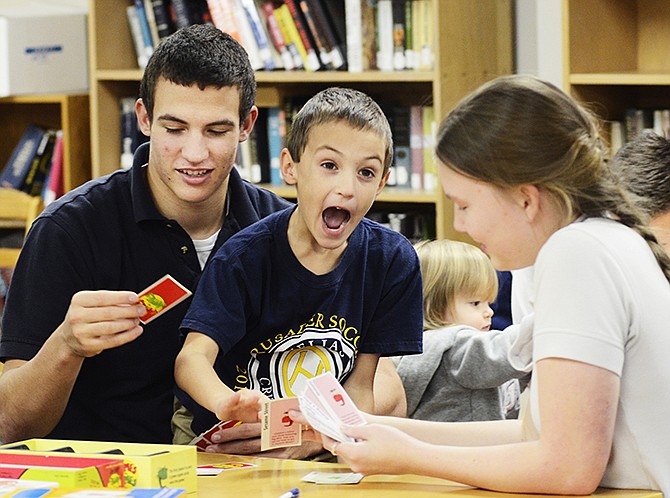In order to learn more about child development, more than 75 seniors at Helias Catholic High School brought younger children to school with them last week.
Not only did the teens play games with their smaller charges, they conducted experiments that illustrated phases of early brain development.
It's the 15th time psychology teacher Chris Cooper has organized the exercise for his students.
"Since we've been learning about cognitive development and language development in class, I was hoping they would witness - solely through observation - some of the concepts we covered," Cooper noted.
Samantha Bruemmer, 17, played a memory-match game with her 4-year-old cousin Emma Heislen. She noticed that Emma's memory was limited to about two turns of the cards, but an older boy was able to play the same game more efficiently.
The high school students didn't simply play board games. They also conducted experiments showcasing Piaget's Theory of Conservation. In the test, two same-size cups with equal amounts of water were set before the children. The liquid was then poured into a tall, thin container and a short, wide container.
They were then asked: "Which holds more water?"
The younger the child, the more likely he or she will incorrectly state the tall, thin beaker has more water in it. (Piaget theorized small children have not yet mastered the notion of reversibility.)
The also learned about "object permanence," a phenomenon typically acquired by the second year of life.
"If a newborn can't see an object, it's gone to them. They think it doesn't exist anymore," explained Casey Clogston, 18.
Cooper's students also learned humans have a window of opportunity for language development, which makes it easier for toddlers to acquire multiple languages simultaneously. However, children who are deprived of hearing speech struggle later in life.
About six sections of seniors - 150 teenagers - participated in Friday's program.
The session taught the high school students to be more patient with small children, Bruemmer suggested.
"I think we expect too much out of little kids," she said.

